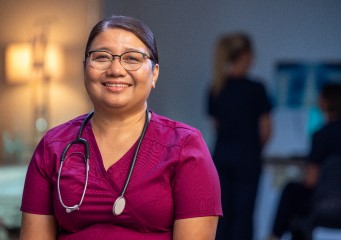Medical Services Careers

Medical officer roles within Northern NSW Local Health District are challenging, inspiring and rewarding.
We are committed to offering professional and personal development opportunities, and to supporting the wellbeing of our doctors and their families.
Our doctors are at the leading edge of medical decision making, departmental and service planning.
We work in highly motivated multidisciplinary clinical teams to ensure that our patients receive prompt and effective care in a contemporary and technologically supported environment.
You'll be supported to develop your skills in your areas of interest, including service planning, clinical governance, departmental management, teaching and research.
We value the diversity of backgrounds within our medical workforce, enriching our effectiveness and our engagement with our patients and community.


Why choose Northern NSW Local Health District
Modern facilities – Our contemporary facilities are always evolving, through service planning and government investment in our thriving Northern Rivers region. A $312.75 million investment in Lismore Base Hospital has resulted in two new hospital towers, helipad, multideck car pack and refurbishment of the existing C Block. The new $723.3 million state of the art Tweed Valley Hospital will open in 2024, and other developments across the region provide first class clinical spaces and technology for our team and their patients.
Our team - Be part of our strong organisational culture focused on patient outcomes.
A healthy and supportive work environment – Living in the best part of Australia, we prioritise our wellbeing.
Learn and grow on the job – we encourage staff to continue their professional development and training, to meet their professional goals amongst experienced and supportive colleagues.
Enhance your skills – With our regional and rural sites you will see a variety of presentations, giving you the opportunity to work within a wide scope of practice and learn new skills.
Contribute to gains in Aboriginal and Torres Strait Islander Health – You can play an active part in obtaining better health outcomes for Aboriginal and Torres Strait Islander people, who make up over 5% of the population of Northern NSW.
Be involved in innovative and collaborative approaches to healthcare education and research – We have strongly established relationships with education providers. These include the Northern NSW Academic Health Alliance (a collaboration between Northern NSW Local Health District and Bond, Griffith and Southern Cross Universities and TAFE NSW) and the University Centre for Rural Health (Universities of Sydney, Wollongong and Western Sydney). These relationships offer involvement in pre-graduate and post graduate education, and research.
Explore current career opportunities in Medical Services in Northern NSW.
Staff Highlights
- Dr Lachlan Scott
-
- Dr Maddie Dick
-
- Dr Jason Koutsodontis
-
- Dr Will Davies
-
- Dr Tara Douglas
-
- Dr Alex Tucker
-
Junior and Senior Medical Officers Career and Training Program
We offer different Junior and Senior Medical opportunities and training programs that can complement your career goals.
Our Junior Medical Officer Training Programs include accredited prevocational training, many specialist training programs including rural generalist training, and many training-supported opportunities for junior doctors still considering their vocational direction.
For established Senior Medical Officers, we offer a variety of specialty and sub-specialty roles for Salaried (with right of private practice) and Visiting Medical Officers (Fee for Service or Sessional contracts). Continued professional development and training is encouraged, with financial support included for Salaried Specialist in the TESL program, and for eligible VMOs through Professional Support Grants.
Learn more:
Sub-Specialty Roles
Many sub-specialty streams exist across the region, in addition to generalist specialty roles.
International Candidates
Northern NSW Local Health District will assist International Candidates with the following:
Visa - We will work with applicants to sponsor and obtain the most preferred visa type and assist with visa costs.
Relocation - Relocation expenses can be salary packaged according to NSW Health guidelines.
Accommodation - Once we have offered you a position, our NNSWLHD Recruitment team will work with you to identify and provide solutions to address your accommodation needs.
Superannuation Contribution - Employer Contribution to Superannuation: For employees, we will contribute 11% of your gross salary each pay fortnight to your nominated superannuation account.
This contribution is in addition to your salary and any incentive payments.
Training, Education and Study Leave (TESL) for Staff Specialists - The NSW Health Staff Specialists Determination provides for appropriate and equitable access to Training, Education and Study Leave (TESL).
TESL is a paid leave and allowance entitlement to cover costs associated with training, education and study, up to $38 000 per year.
Full time staff specialists are entitled to 25 calendar days of TESL per year. The entitlements for expenses and leave are pro-rata for part-time staff specialists.
Annual Leave - All salaried Senior Medical Officers working in NSW Health work under the conditions of the relevant (State) Award.
Some of the Award benefits include:
- 5 weeks paid annual leave plus 17.5% leave loading
- 2 weeks paid personal/carer/sick leave, cumulative.
View the Staff Specialist Award.
- Information for Visiting Practitioners
-
Interpretation
“Local Health District” means the Northern NSW Local Health District (NNSWLHD) “Clinical Service” means a health service and includes a hospital, unit, community service or other service at which the visiting practitioner has clinical privileges. “Clinical Service Manager” means the person to whom the practitioner is immediately responsible for the performance of duties and clinical care of patients. “Major Hospitals” for the purpose of these quinquennium appointments means The Tweed Hospital, Murwillumbah District Hospital, Lismore Base Hospital and Grafton Base Hospital. “Networked Services” means a coordinated clinical service conducted at two or more hospitals or health services by NNSWLHD “Peripheral Hospitals” for the purpose of these quinquennium appointments means public hospitals that are not Major Hospitals. “Specialist” means a medical practitioner recognised as a Specialist for the purpose of the Health Insurance Act 1973 (Commonwealth) “Visiting Practitioner” means a medical practitioner or dentist who is appointed, otherwise than as an employee, to practise as a medical practitioner or dentist in accordance with the conditions of appointment (including HMOs, VMOs and VDOs). The term applies to visiting practitioners appointed otherwise than under a service contract.
Appointment and Clinical Privileges
- Each Visiting Practitioner is appointed by the Chief Executive, with such clinical privileges as are determined by the Chief Executive on the recommendation of the Medical and Dental Appointments Advisory Committee (MDAAC). Appointments are to the NNSWLHD with clinical privileges being granted to undertake specific clinical services.
- A Visiting Practitioner wishing to vary their clinical privileges should make application through their clinical service manager to the MDAAC and the Chief Executive to have any such variation approved. No changes to the clinical privileges are to be made until the approval of the Chief Executive has been obtained, following advice from the MDAAC.
- Appointments are subject to the Chief Executive being satisfied, on the advice of the MDAAC as to the ongoing personal and professional conduct, performance and services of each Visiting Practitioner. The relevant standards of professional conduct for Visiting Practitioners are the NSW Health Code of Conduct (all Visiting Practitioners), the NSW Medical Board’s Code of Professional Conduct (medical practitioners), and the code of conduct issued by a relevant professional college.
- An appointment to NNSWLHD shall be regarded as a single appointment. Clinical privileges may extend to more than one hospital or service. This will be reflected in the contractual arrangements between the appointee and NNSWLHD. Resignation by a VMO specialist from a Major Hospital shall relate to the entire appointment. It cannot be subsequently divided into multiple appointments despite the fact that there may be multiple contracts relating to the services provided at different hospitals which may be necessitated by the different remuneration arrangements required to be put in place at such hospitals.
- Resignation in accordance with the Health Services Regulation 2013 from a VMO appointment in which privileges have been provided to a Major Hospital shall automatically trigger the termination of the contingent clinical privileges at any other NNSWLHD hospital or service. Specialist VMOs may resign their secondary appointment at Peripheral Hospitals subject to the period of notice provided in their service contract and the Health Service Regulation 2013, without affecting their Major Hospital appointment.
- Where VMO Specialists are appointed to Networked Services such appointment is indivisible and conditional upon continuation of the provision of services. VMOs cannot resign from any part of the Networked Services arrangement without resigning from all their appointments with NNSWLHD.
Terms and Conditions
- Terms and conditions for Visiting Medical Officers and Honorary Medical Officers (except Radiologists and Pathologists) are prescribed in standard Sessional and Fee-for-Service contracts (including form of Fee-for-Service Contract for Rural Doctor Package Hospitals) and related determinations/settlement package including:
- Public Hospitals (Visiting Medical Officers – Fee-for-Service Contracts) Determination 2007
- Public Hospitals (Visiting Medical Officers – Sessional Contracts) Determination 2007
- Rural Doctors Settlement Package
Unpaid Leave of Absence
- All unpaid leave of absence must receive the prior approval of the clinical service manager. Other than in unforeseen circumstances beyond the control of the practitioner, at least 6 weeks prior notice of unpaid leave of absence is to be given to the clinical service manager. Applications for unpaid leave of absence should be made in consultation with relevant clinical colleagues and should be made in writing to the relevant clinical service manager.
- To provide NNSWLHD with assurance of the continuity of medical care to patients, the visiting practitioner should hand over patients to another medical practitioner prior to commencing unpaid leave of absence.
- The NNSWLHD is responsible for appropriate arrangements for cover whilst the visiting practitioner is on unpaid leave of absence. However, the NNSWLHD would appreciate advice on cover arrangements when applying for unpaid leave of absence, particularly in circumstances where the visiting practitioner is also making arrangements for cover of their private practice.
- The NNSWLHD shall be responsible for the appointment of locum Visiting Practitioners to the Local Health District.
Adherence to Policies
- The Visiting Practitioner must comply with NSW Health policies prescribed as mandatory for health service staff and Visiting Practitioners including (but not limited to) those relating to the provision of clinical services, code of conduct, occupational health and safety, immunisation, workplace harassment, equal employment opportunity and reporting of criminal convictions or disciplinary findings. Visiting Practitioners are to also to comply with NNSWLHD Policies and By-Laws.
- Visiting Practitioners may also be required to take part in training that may, from time to time, be deemed mandatory by the Ministry of Health or the Local Health District. This will include relevant training relating to child protection.
- A Visiting Practitioner should also take reasonable steps to comply with requests for information and other reports required under Ministry of Health policies and guidelines for supplying information relating to child protection.
Registration, Certification and Medical Indemnity
- Each Visiting Practitioner will maintain all certification and registration necessary to enable them to provide the clinical services covered by their appointment. Evidence of this must be provided to the NNSWLHD promptly after being obtained. Any cancellation or suspension of such certification or registration must be notified to the NNSWLHD immediately.
- Adequate professional indemnity cover with a recognised medical defence organisation or insurer must be maintained by each Visiting Practitioner at all times during the term of their appointment. Any change in status must be immediately notified to the Visiting Practitioner’s Clinical Service Manager.
- The NNSWLHD shall offer each medical practitioner proposed for appointment as a visiting medical officer, who is eligible for professional indemnity cover from the New South Wales Treasury Managed Fund under the applicable policies of the NSW Ministry of Health as issued from time to time, an approved contract of liability coverage covering the term of the practitioner’s proposed appointment as a visiting medical officer at the same time it provides a written service contract.
- A VMO must have approved professional indemnity insurance in respect of civil liability arising from the officer’s practice of medicine at a public health organisation, including in respect of persons who elect to be private patients, to the extent that such liability is not covered by an approved contract of liability coverage.
Discipline, Resignation, or Termination of Appointment
- Should the need arise to counsel or discipline a Visiting Practitioner for minor breaches of their obligations under the terms and conditions of appointment, this will be done in the first instance by the clinical service manager or NNSWLHD management.
- Subject to the terms of appointment a Visiting Practitioner may, following an investigation commissioned by the Chief Executive of NNSWLHD for that purpose, be suspended or terminated at any time by the Chief Executive where there has been a serious failure by the Visiting Practitioner to observe the terms and conditions of their appointment. Any Visiting Practitioner dealt with under this clause will be afforded due process and procedural fairness.
- A Visiting Practitioner seeking to resign from their appointment must give at least three months’ (or such lesser period as is agreed by the Chief Executive) notice in writing to the Chief Executive.
Performance Review of Visiting Practitioners
- Visiting Medical Practitioners will be required, under NSW Ministry of Health (MoH) requirements to participate in an annual performance review arrangement with their supervisor. This is in the interest of enhancing professional development and Local Health District objectives by providing regular feedback about performance and identifying appropriate development opportunities, providing an opportunity for two-way feedback, and to identify opportunities for the Local Health District to support the practitioner in maintaining and improving performance and managing issues.
- These general principles are the result of extensive consultation between the NSW MoH, AMA, ASMOF, The Rural Doctor’s Association and Local Health Districts.
Reappointment
- For VMOs and VDOs only, advertising of positions is not required in circumstances where:
- The role and responsibilities for the VMO/VDO remains largely unchanged since their original appointment
- There has been a Level 2 review of the VMO/VDO in the penultimate year of the term of their appointment
- The performance has been found to be such as to warrant renewal without advertising
- The public health organisation has decided that it is appropriate to appoint a specialist VMO/VDO with an existing appointment; for a further term (refer to NSW Health Policy Directives PD2011_010 Visiting Medical Officer Performance Review Arrangements and PD2013_013 Visiting Dental Officers Remuneration and Contract Requirements respectively).
- Public health organisations have discretion to apply the performance review arrangements set out in PD2011_010 to general practitioner VMOs.
Explore current career opportunities in Medical Services in Northern NSW.
Contact
NNSWLHD offers a unique and exciting opportunity for medical officers.
If you want to learn more about the medical officer positions available or have questions about our region or specific questions about re-location, housing, education or anything else, please email: NNSWLHD-CandidateExperienceTeam@health.nsw.gov.au
Related pages:
• Working in Northern NSW
• Rural Incentive Scheme
• Employee Benefits
